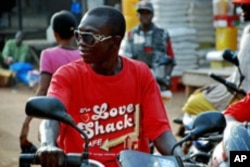Castoff American t-shirts, which have flooded African markets for years, are starting to trickle back to the United States as part of a non-profit initiative spearheaded by two young American social entrepreneurs.
American Sean Hewens said he recently was stuck in a traffic jam in Nairobi, Kenya, when he saw a t-shirt worn by a rickshaw pusher promoting a 2006 bar mitzvah for a teenager called Josh in California.
Hewens became curious about how that t-shirt had traveled so far, and found out many castoff t-shirts from the United States end up being sold in markets across the developing world.
T-shirt turnaround
"You know a t-shirt that means something specific, such as Josh's bar mitzvah, in one place, and then these t-shirts go to the Goodwill and they get sold overseas and resold. From a cultural perspective, things get all mixed up and turned around."
So Hewens decided to turn some of these t-shirts around another time in what he calls Project Repat, as a side project to finance his expanding technology and cultural non-profit called Smallbean.
Retro, funny, ironic, sports-themed, place- and event-specific t-shirts are bought in African markets, cleaned up, stamped with date and location and the Project Repat logo, and sold back to U.S. consumers for $25, of which $20 goes toward funding non-profits.
Using social media
Hewens said he was amazed by the social media-fueled positive response, not only from buyers, but also from volunteers who are buying t-shirts in Africa and donating them to Project Repat.
"The response that we have gotten from Project Repat, I think it had something to do with the t-shirts, I think it had something to do with this really authentic story behind it," he said.
"But I will be honest, we have just been absolutely flabbergasted by the response and definitely in a good way."
Hewens said so-called t-shirt agents - or "repatriots" as he also calls them - will never take a t-shirt off someone's back, but only buy them in markets.
Supporting local markets, non-profits
The other initiator of the project is Ross Lohr. He heads the Newton Tanzania Collective, which helps schoolchildren in Tanzania and connects them to students in the United States.
Lohr says "Project Repat" also reinforces the meaning of each t-shirt. "Each shirt is incredibly unique. It has a story to tell and in a way it is sort of a double hero because it is supporting local markets in places like Kenya and Tanzania, while at the same time it is supporting non-profits."
And he said the t-shirt return process has proven to be a very effective way to raise funds.
"It is tough to be going back to your donor base all the time, the same donors trying to secure funding," said Lohr. "For us, this was really a way to leverage a new demographic, philanthropy and fundraising. You need to find a revenue-generation model, you need to find a way to get new people interested."
The two Boston residents also have used an online fundraising platform to make a documentary movie. Filming is due to begin later this month in Nairobi, when they aim to delve deeper into the stories of the t-shirts and the people who wear, sell, buy and recover them.





